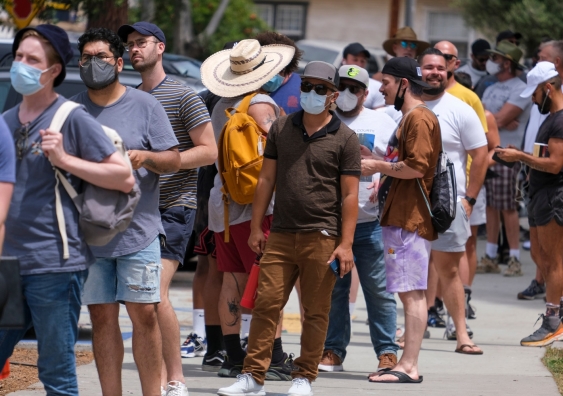HIV history can't repeat itself with monkeypox, ╣·├±▓╩Ų▒ social scientist warns
Lessons from the HIV epidemic should be applied to efficiently tackle the monkeypox outbreak and to avoid stigma.
Lessons from the HIV epidemic should be applied to efficiently tackle the monkeypox outbreak and to avoid stigma.

Nadia Razzhigaeva
╣·├±▓╩Ų▒ Arts Design & Architecture News & Content Coordinator
02 9348 1229
n.razzhigaeva@unsw.edu.au
In July, the World Health Organization (WHO) declared monkeypox a of international concern after more than 88 countries recorded cases.
With only 70 current cases in Australia, AustraliaŌĆÖs response has been relatively quick, as vaccines arrived on our shores just a few months after two initial cases were detected in May. But thatŌĆÖs not the end of it.
, an expert in HIV prevention at ╣·├±▓╩Ų▒ Centre for Social Research in Health (CSRH), says we now have a critical period during vaccine rollout that we canŌĆÖt afford to get wrong.
ŌĆ£With monkeypox, we must avoid a moralising reaction like in the 1980s when HIV and AIDS were first recognised.
ŌĆ£Using knowledge we have from handling the HIV and COVID-19 pandemics, we must guard against stigma and harmful rhetoric that may inhibit a public health response. Ensuring this will mean an effective and efficient rollout of the monkeypox vaccine, and encourage people to come forward for testing if they think they have been exposed,ŌĆØ he says.
Like early cases of HIV, recent cases of monkeypox in high-income countries were first noticed among gay and bisexual men.
Monkeypox has been recognised in some African countries since the 1970s and can be passed on by skin-to-skin contact with someone who is infectious, and through contact with shared towels and bed linen.
However, of the current outbreak suggests monkeypox is mainly being passed on during sex between men. This creates a challenge to educate and inform people who may be at risk while avoiding stigmatising or judgmental commentary.
ŌĆ£In overseas commentary we can see a tension between saying ŌĆśmonkeypox can affect anyoneŌĆÖ, which is technically true, but people most at risk of infection in the current outbreak are gay and bisexual men,ŌĆØ says Prof. Holt.
ŌĆ£Informing people about how monkeypox is being passed on is necessary so people can seek advice and help if they have been exposed, and vaccination if they think they are at risk. What we want to counter is the moralising response we saw in the early years of HIV in which people were judged or blamed for being at risk.ŌĆØ

During vaccination roll out we must guard against stigma and harmful rhetoric. Photo: Shutterstock.
In the ŌĆÖ80s, HIV was first detected in high-income countries among gay and bisexual men and people who injected drugs. The association of HIV transmission with sex between men and illicit drug use led some conservative critics to react to HIV with hostility, Prof. Holt says. ┬Ā
ŌĆ£Disapproval of homosexuality and drug use fuelled hostile public discourse in the early years of the HIV epidemic, and this led to fear, misinformation and stigma.
ŌĆ£What we saw in the ŌĆÖ80s was that some of those who contracted HIV were blamed for the way they acquired the infection, which is a parallel between HIV and monkeypox that public health practitioners want to avoid ŌĆō that those who are at risk of monkeypox will be blamed for an infection that is not their fault.
ŌĆ£This is where we donŌĆÖt want to repeat the history of what we went through with HIV ŌĆō we want to reassure people who may be at risk of monkeypox that they will receive help and support, and that they have done nothing wrong if they think they have been exposed.ŌĆØ
Ultimately, he says, we need to avoid harmful and hateful rhetoric to get on top of the outbreak. Underscoring sensitivities about how the virus is being discussed, the WHO is currently considering changing the name of monkeypox to counter inaccurate and potentially racist connotations.
There is an argument being put forward by some commentators in the US that public health messaging should tell people to not have sex ŌĆō that sex is too dangerous right now and that gay and bisexual men in particular should abstain.
ŌĆ£We know from 40 years of dealing with HIV and related sexual health work that sexphobic responses are really unhelpful and toxic,ŌĆØ says Prof. Holt.
ŌĆ£Judgmental responses make people scared to seek help and to want to hide. ItŌĆÖs also demeaning to tell people that they donŌĆÖt have the right to have intimate contact with anybody else.
ŌĆ£We can encourage people to take sensible precautions, like getting tested if they┬Āhave symptoms, and to seek vaccination, without generating fear.ŌĆØ
In Australia, we have a critical moment where we can avoid creating a toxic and unsupportive environment, says Prof. Holt.
AustraliaŌĆÖs monkeypox public health response is currently focusing on targeting those most at risk (primarily gay and bisexual men who have recently returned from overseas, or who have more sex partners) by communicating via trusted community groups and health authorities. However, while vaccines have landed in Australia and the rollout has begun, it isnŌĆÖt possible to vaccinate everybody immediately. ┬Ā
ŌĆ£This period, in which vaccine availability is limited,┬Āwill hopefully only last a couple of months. ItŌĆÖs a critical time in which we people are encouraged to come forward to receive a vaccine or get a check-up, but also to remain patient as vaccine supplies increase,ŌĆØ says Prof. Holt.
ŌĆ£Maintaining a supportive, non-judgmental climate is key, because we know from dealing with HIV that fear and stigma can stop people from coming forward.ŌĆØ
Experience has shown that listening to the community, showing respect and avoiding judgment means that those at risk will respond positively to a call to action like getting vaccinated or getting a check-up.
Read more:┬Ā
ŌĆ£Gay and bisexual men are good at responding to calls to action as long as theyŌĆÖre being treated respectfully,ŌĆØ says Prof. Holt.
ŌĆ£In Australia, we can focus on maintaining a positive, community-led, collaborative response and avoid victim blaming.
ŌĆ£WeŌĆÖve been fortunate in Australia that we havenŌĆÖt had a media pile-on like in the United States and so we have a great opportunity to respond quickly while commentary is balanced.
ŌĆ£But we also must be vigilant in maintaining a supportive environment and tackling hostile commentary head-on. My team at the Centre for Social Research in Health intends to be involved in tackling any misinformation about monkeypox that may arise in Australia.ŌĆØ
Prof. Holt is part of a team of researchers developing a national survey for gay and bisexual men to assess knowledge and concern about monkeypox, changes to behaviour in response to the outbreak, and willingness to be vaccinated. The survey will be conducted online and launched soon.┬Ā